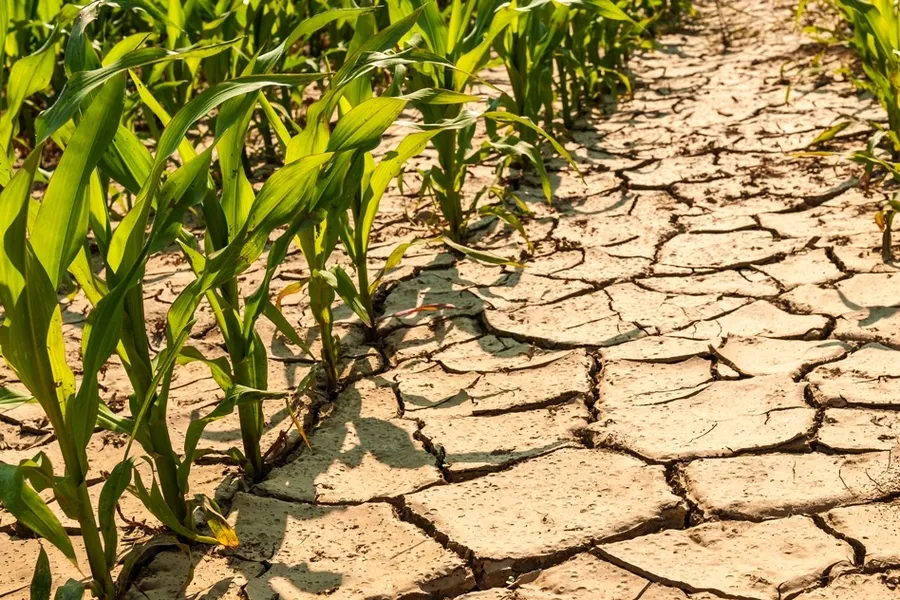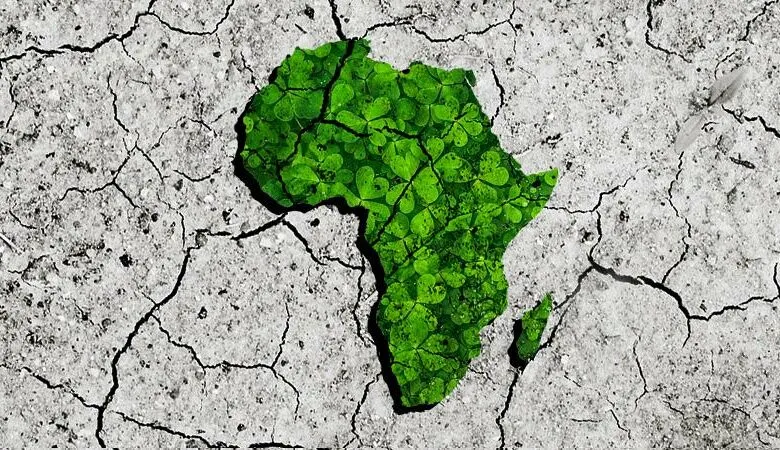Africa most affected by climate change
Africa, a continent characterized by its wide geographical and cultural diversity, is facing great environmental challenges that make it one of the regions most affected by climate change. Although greenhouse gas emissions from the African continent make up a small part of the global total, the effects of climate change are more pronounced and harmful in it than in other regions of the world. These effects are manifested in floods, droughts, desertification, and reduced agricultural yields, threatening the livelihoods and socio-economic stability of the continent’s population.
Factors that make Africa the most affected by climate change
High dependence on agriculture
Africa is heavily dependent on agriculture as its main source of income and food. More than 60% of the population is engaged in agricultural activities, often these activities are not irrigated and are highly dependent on rainfall. This makes agriculture in Africa very vulnerable to weather changes such as droughts and floods. Climate changes lead to irregular rains and increased periods of drought, which leads to a decline in agricultural production, food shortages, and increased rates of poverty and hunger.
In addition to direct dependence on agriculture, agriculture-related activities such as ranching and fishing are also affected by climate change. Drought reduces the availability of water and pastures, which affects livestock breeding. Rising temperatures and changing rainfall patterns are also affecting rivers and lakes, reducing the quantities of fish available for fishing. All these factors contribute to the aggravation of the economic and social conditions of the rural population, which makes up a significant percentage of the population in Africa.
Lack of resources and technological capabilities
African countries are experiencing an acute shortage of financial and technological resources. This shortage hinders the ability of these countries to adapt to climate change or mitigate its effects. For example, many farmers lack access to modern farming techniques that could help them improve their productivity and avoid losses associated with climate changes. In addition, the lack of funding hinders the ability of governments to implement necessary infrastructure projects such as irrigation systems and dams that can mitigate the effects of droughts and floods.
The lack of resources is not limited only to agricultural technology, but also includes the lack of health, educational and environmental infrastructure. This shortage makes communities more vulnerable to climate change-related diseases such as malaria and dengue fever, which can spread as a result of weather changes. The lack of education and environmental awareness also makes the population less able to adapt to climate changes and take the necessary preventive measures.
Economic and political fragility
Many African countries suffer from economic and political fragility, which makes it even more difficult to deal with natural disasters and environmental changes. Unstable economic systems, poor governance, conflicts, and corruption pose additional challenges hindering climate change adaptation efforts. Often, limited resources are diverted towards dealing with immediate crises rather than investing in long-term measures to adapt to climate change. This fragility leads to poor response to natural disasters and the inability to quickly and efficiently rebuild communities after disasters occur.
Political unrest and armed conflicts further exacerbate the effects of climate change. Conflict zones find it more difficult to cope with natural disasters, where infrastructure is destroyed and resources are directed towards the war effort rather than efforts to adapt to climate change. In addition, corruption hinders the implementation of environmental projects and sustainable initiatives, which makes efforts to adapt to climate change ineffective.
Africa is one of the continents most affected by climate change due to its high dependence on agriculture, lack of resources and technological capabilities, and economic and political fragility. Meeting these challenges requires strengthening infrastructure, investing in technology, and enhancing political and economic stability. Regional and international cooperation and the exchange of experiences and resources can help build the continent’s resilience to climate change and ensure a more sustainable future for its people.

Effects of climate change on Africa
Drought and desertification
Drought and desertification are two of the most prominent direct effects of climate change in Africa. The Sahel region of Africa is one of the regions most affected by drought, as it has experienced a significant decrease in rainfall rates and an increase in prolonged dry periods. This led to the degradation of agricultural land and the loss of fertility, which made it unsuitable for agriculture. Desertification also leads to a shortage of water resources, as groundwater levels decrease and seasonal rivers and lakes disappear, which makes it more difficult to obtain clean water for drinking and agriculture.
Flooding
On the other hand, many African countries have experienced an increase in flood rates as a result of climate changes. Heavy and frequent rains, which are sometimes the result of strong hurricanes and storms, cause large-scale flooding. These floods displace thousands of residents and destroy homes and critical infrastructure such as roads and bridges. For example, countries such as Nigeria and Kenya were significantly affected by floods that led to the destruction of agricultural crops and the displacement of the population, which increased the suffering of local residents and hampered development efforts.
Decline in agricultural production
Climate change is directly affecting agricultural production in Africa. Changes in precipitation patterns and increasing temperatures lead to instability of agricultural seasons, which makes it difficult for farmers to predict planting and harvesting seasons. This fluctuation leads to a decrease in the productivity of crops such as corn, wheat and rice, which are considered the basis of food security in many African countries. As a result, these countries face food shortages, which leads to an increase in poverty and hunger rates. The high dependence on agriculture makes these countries more vulnerable to the negative impact of climate change.
Diseases
Climate changes significantly contribute to the spread of infectious diseases in Africa. Floods lead to contamination of water sources and the spread of waterborne diseases such as cholera and diarrhea. Drought and changing rainfall patterns can increase the spread of mosquito-borne diseases such as malaria and dengue fever, as humid conditions create a favorable breeding environment for mosquitoes. Changes in temperature and humidity also affect the spread of plant and animal diseases, which in turn affects human and animal health and agricultural crops.
The effects of climate change on Africa encompass a wide range of environmental, economic and health problems. Droughts, desertification, floods, declining agricultural production and the spread of diseases all significantly affect the life of the population and their ability to adapt to these changes. Meeting these challenges requires coordinated efforts that include improving infrastructure, strengthening health systems, developing sustainable agricultural strategies, as well as regional and international cooperation to support local efforts in adapting to climate change.

Strategies for coping with the effects of climate change in Africa
Strengthening infrastructure
Improving infrastructure is one of the key solutions to natural disasters caused by climate change in Africa. The development of early warning systems can save lives by providing advance warnings of impending disasters such as floods and hurricanes, giving residents enough time to evacuate and take precautions. The construction of dams can contribute to the control of water flow, reducing the risk of flooding and improving the management of Water Resources during periods of drought. In addition, the creation of modern and sustainable irrigation systems can enhance the efficiency of water use, ensuring the availability of water for farmers even in dry periods, thereby protecting crops and improving agricultural production.
Investment in agricultural technology
Modern agricultural technology represents a powerful tool to help farmers adapt to climate changes. Technologies such as drip irrigation and precision farming can improve water use efficiency, enabling farmers to use less water to achieve high productivity. The use of drought-and heat-resistant crop varieties can enhance the endurance of Agriculture in the face of harsh climatic conditions. Also, Biotechnology can contribute to the development of crops with faster growth cycles and the ability to grow on poor soils, which enhances food security and reduces dependence on ideal climatic conditions.
Regional and international cooperation
African countries need to strengthen cooperation among themselves and with the international community to effectively address the challenges of climate change. Sharing experiences and knowledge can help countries adopt best practices and adaptation strategies that have proven successful in similar regions. Coordination between countries in projects such as cross-border Water Resources Management can reduce conflicts and improve the sustainable use of resources. Financial and technical support from the international community can strengthen local capacities to adapt to climate change by financing environmental projects and sustainable technologies.
Promote environmental awareness
Raising environmental awareness among the population and decision-makers is an essential part of the climate change adaptation strategy. Educating the population about the importance of conserving natural resources and adopting sustainable agricultural practices can limit the negative impacts of climate change. Awareness and education programs can encourage communities to participate in conservation initiatives such as reforestation and sustainable waste management. The promotion of environmental awareness among decision-makers can also push towards the formulation of more effective environmental policies and support for green projects, contributing to building a sustainable future for the region.
To address the impacts of climate change in Africa, a comprehensive approach should be adopted that includes strengthening infrastructure, investing in agricultural technology, strengthening regional and international cooperation, and raising environmental awareness. These integrated strategies can help the continent adapt to increasing climate changes and ensure a more sustainable and stable future for its population. Rapid and coordinated action can protect the environment, enhance food security, and improve the quality of life in the face of climate challenges.
You can visit the AHAD website to find out more about the projects it offers
ALSO READ
WHAT THE FOOD BASKET CONTAINS IN AHAD
Join us in our message




